高一英语 第三单元 TRAVEL JOURNAL 复习重点
- 格式:docx
- 大小:47.33 KB
- 文档页数:14
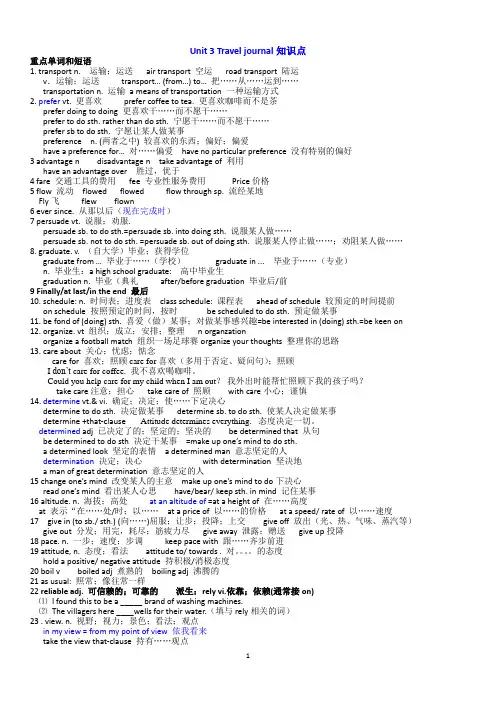
Unit 3 Travel journal知识点重点单词和短语1. transport n. 运输;运送air transport 空运road transport 陆运v.运输;运送transport… (from…) to…把……从……运到……transportation n. 运输a means of transportation 一种运输方式2. prefer vt. 更喜欢prefer coffee to tea. 更喜欢咖啡而不是茶prefer doing to doing 更喜欢干……而不愿干……prefer to do sth. rather than do sth. 宁愿干……而不愿干……prefer sb to do sth. 宁愿让某人做某事preference n. (两者之中) 较喜欢的东西;偏好;偏爱have a preference for…对……偏爱have no particular preference 没有特别的偏好3 advantage n disadvantage n take advantage of 利用have an advantage over 胜过,优于4 fare 交通工具的费用fee 专业性服务费用Price价格5 flow 流动flowed flowed flow through sp. 流经某地Fly飞flew flown6 ever since. 从那以后(现在完成时)7 persuade vt. 说服;劝服.persuade sb. to do sth.=persuade sb. into doing sth. 说服某人做……persuade sb. not to do sth. =persuade sb. out of doing sth. 说服某人停止做……;劝阻某人做……8. graduate. v. (自大学)毕业;获得学位graduate from …毕业于……(学校)graduate in ... 毕业于……(专业)n. 毕业生:a high school graduate: 高中毕业生graduation n. 毕业(典礼after/before graduation 毕业后/前9 Finally/at last/in the end 最后10. schedule: n. 时间表;进度表class schedule: 课程表ahead of schedule 较预定的时间提前on schedule 按照预定的时间,按时be scheduled to do sth. 预定做某事11. be fond of (doing) sth. 喜爱(做)某事;对做某事感兴趣=be interested in (doing) sth.=be keen on12. organize. vt 组织;成立;安排;整理n organzationorganize a football match 组织一场足球赛organize your thoughts 整理你的思路13. care about 关心;忧虑;惦念care for 喜欢;照顾care for 喜欢(多用于否定、疑问句);照顾I don’t care for coffee. 我不喜欢喝咖啡。
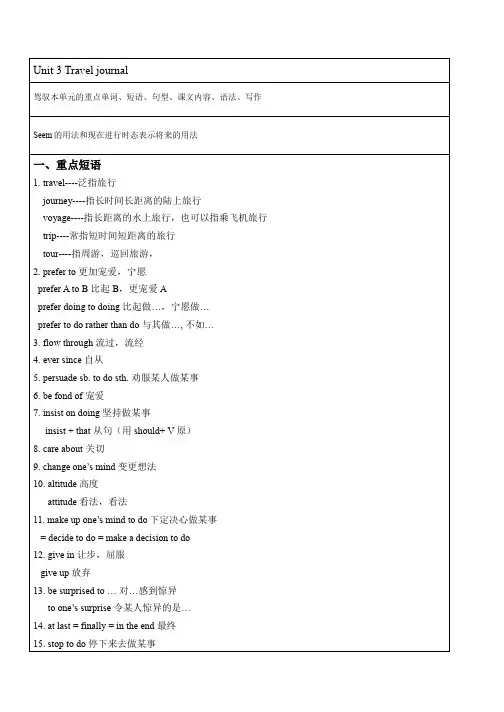
stop doing 停止做某事16. as usual 像平常一样17. so…that 如此… 以至于…So + adj + a/an + n. + thatSuch + a/an +adj. + n. + that18. be familiar with 对…熟识(人作主语)be familiar to 为…所熟识(物作主语)二、学问要点1. Which kind of transport do you prefer to use: bus or train?prefer v.更宠爱;选择某事物(而不选择其他事物)(1)prefer sth.更宠爱……prefer (sb.) to do sth.更宠爱(某人)做……prefer that更宠爱[that从句中常用(should)+动词原形]prefer sth./doing...to sth./doing...与……相比更宠爱……;宁愿……,不愿……e.g. I would prefer meat to fish.我宠爱肉赛过(宠爱)鱼。
I prefer singing to acting. 我宠爱唱歌赛过演戏。
prefer to do...rather than do...宁可……也不……e.g. He prefers to stay at home rather than go shopping.他宁可呆在家里也不情愿去逛商店。
(2)preference n. 偏爱;爱好;宠爱give preference to sb./sth.给……以实惠;优待2. Then she persuade me to buy one.然后她动员我也买了一辆.persuade vt.劝服; 劝服; vi.被劝服persuade sb. (not) to do sth.persuade sb. into / out of doing sth.e.g. I persuaded him to do it. = persuade him into doing it.我已劝服他做这件事。
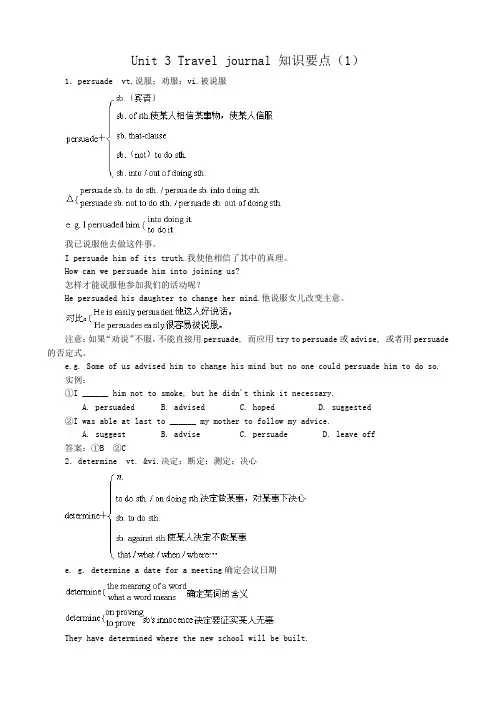
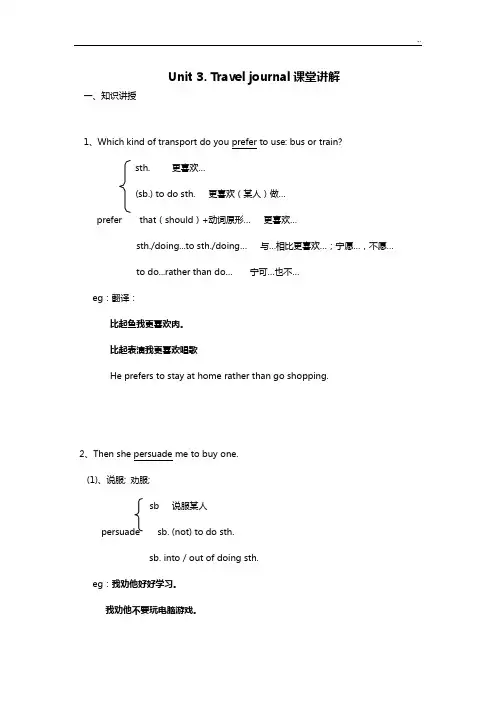
Unit 3. Travel journal课堂讲解一、知识讲授1、Which kind of transport do you prefer to use: bus or train?sth. 更喜欢…(sb.) to do sth. 更喜欢(某人)做…prefer that(should)+动词原形…更喜欢…sth./doing...to sth./doing…与…相比更喜欢…;宁愿…,不愿…to do...rather than do…宁可…也不…eg:翻译:比起鱼我更喜欢肉。
比起表演我更喜欢唱歌He prefers to stay at home rather than go shopping.2、Then she persuade me to buy one.(1)、说服; 劝服;sb 说服某人persuade sb. (not) to do sth.sb. into / out of doing sth.eg:我劝他好好学习。
我劝他不要玩电脑游戏。
(2)、使相信,使信服persuade sb that …使某人相信…eg:他使我相信了这个事实【注意】如果“劝说”不服, 不能直接用persuade, 而应用try to persuade sb to do 或advise sb to do, 或者用persuade的否定式。
3、After graduating from college, we finally got the chance to take a bike trip.【辨析】finally, at last与in the end4、Although she didn’t know the best way of getting get to places, she insistedthat she organize the trip properly.(1)、although, though引导让步状语从句不能再和but, and, however连用, 但可以和副词yet, still连用。
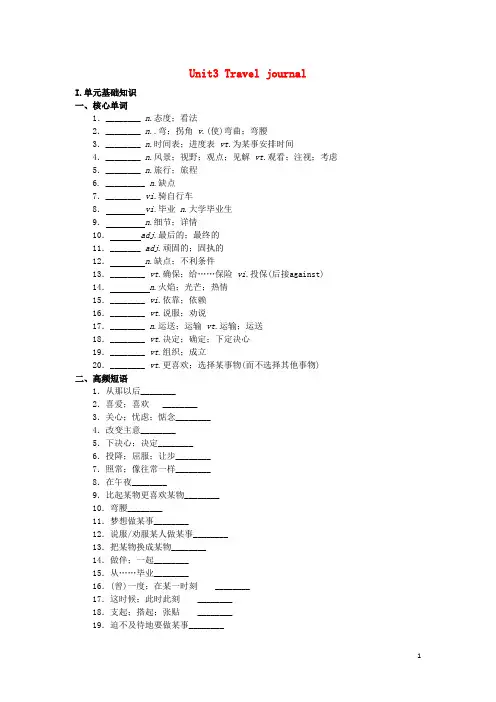
Unit3 Travel journalI.单元基础知识一、核心单词1.________ n.态度;看法2.________ n..弯;拐角v.(使)弯曲;弯腰3.________ n.时间表;进度表vt.为某事安排时间4.________ n.风景;视野;观点;见解vt.观看;注视;考虑 5.________ n.旅行;旅程6. _________ n.缺点7.________ vi.骑自行车8.vi.毕业n.大学毕业生9. n.细节;详情10.adj.最后的;最终的11._______ adj.顽固的;固执的12.n.缺点;不利条件13.________ vt.确保;给……保险vi.投保(后接against) 14.n.火焰;光芒;热情15.________ vi.依靠;依赖16.________ vt.说服;劝说17.________ n.运送;运输vt.运输;运送18.________ vt.决定;确定;下定决心19.________ vt.组织;成立20.________ vt.更喜欢;选择某事物(而不选择其他事物) 二、高频短语1.从那以后________2.喜爱;喜欢________3.关心;忧虑;惦念________4.改变主意________5.下决心;决定________6.投降;屈服;让步________7.照常;像往常一样________8.在午夜________9.比起某物更喜欢某物________10.弯腰________11.梦想做某事________12.说服/劝服某人做某事________13.把某物换成某物________14.做伴;一起________15.从……毕业________16.(曾)一度;在某一时刻________17.这时候;此时此刻________18.支起;搭起;张贴________19.迫不及待地要做某事________20.天气预报________三、重点句型(填空)1. It was my sister ________ first had the idea to cycle along the entire MekongRiver from ________ it begins to where it ends.是我姐姐先想到要沿着湄公河骑自行车,从它的源头一直骑到入海口。
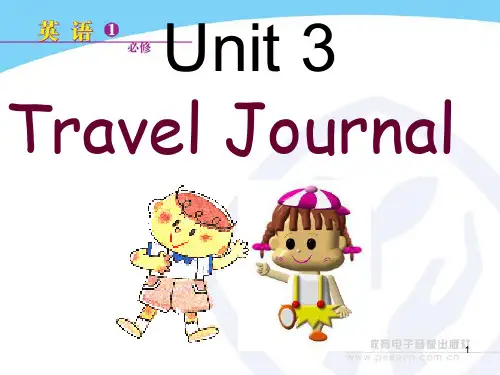
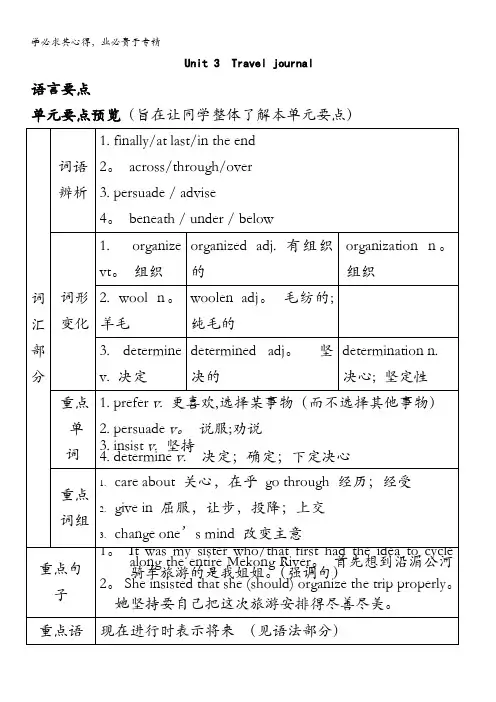
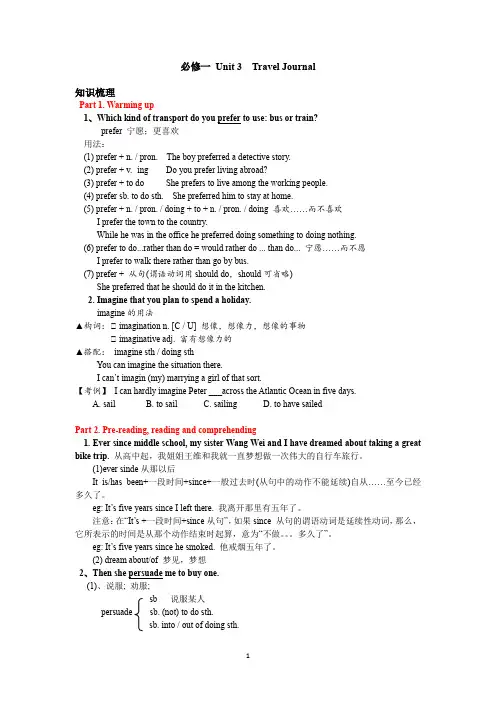
必修一Unit 3 Travel Journal知识梳理Part 1. Warming up1、Which kind of transport do you prefer to use: bus or train?prefer 宁愿;更喜欢用法:(1) prefer + n. / pron. The boy preferred a detective story.(2) prefer + v. -ing Do you prefer living abroad?(3) prefer + to do She prefers to live among the working people.(4) prefer sb. to do sth. She preferred him to stay at home.(5) prefer + n. / pron. / doing + to + n. / pron. / doing 喜欢……而不喜欢I prefer the town to the country.While he was in the office he preferred doing something to doing nothing.(6) prefer to do...rather than do = would rather do ... than do... 宁愿……而不愿I prefer to walk there rather than go by bus.(7) prefer + 从句(谓语动词用should do,should可省略)She preferred that he should do it in the kitchen.2. Imagine that you plan to spend a holiday.imagine的用法▲构词:① imagination n. [C / U] 想像,想像力,想像的事物② imaginative adj. 富有想像力的▲搭配:imagine sth / doing sthYou can imagine the situation there.I can’t imagin (my) marrying a girl of that sort.【考例】I can hardly imagine Peter ___across the Atlantic Ocean in five days.A. sailB. to sailC. sailingD. to have sailedPart 2. Pre-reading, reading and comprehending1. Ever since middle school, my sister Wang Wei and I have dreamed about taking a great bike trip. 从高中起,我姐姐王维和我就一直梦想做一次伟大的自行车旅行。
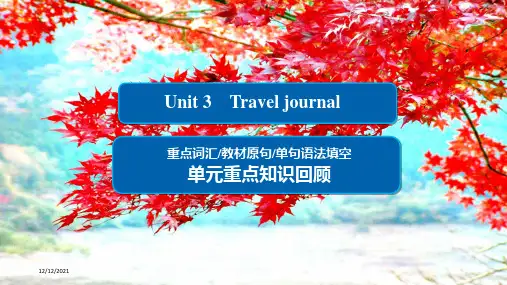
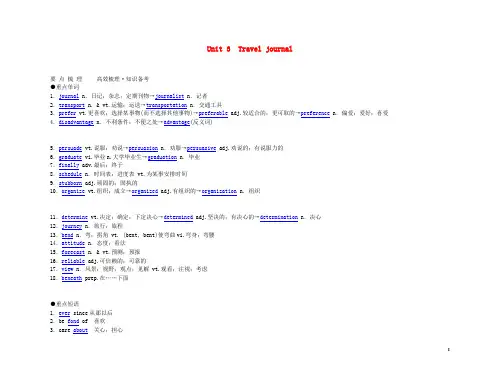
Unit 3 Travel journal要点梳理高效梳理·知识备考●重点单词1.journal n.日记;杂志;定期刊物→journalist n.记者2.transport n. & vt.运输;运送→transportation n.交通工具3.prefer vt.更喜欢;选择某事物(而不选择其他事物)→preferable adj.较适合的;更可取的→preference n.偏爱;爱好;喜爱4.disadvantage n.不利条件;不便之处→advantage(反义词)5.persuade vt.说服;劝说→persuasion n.劝服→persuasive adj.劝说的;有说服力的6.graduate vi.毕业n.大学毕业生→graduation n.毕业7.finally adv.最后;终于8.schedule n.时间表;进度表 vt.为某事安排时间9.stubborn adj.顽固的;固执的10.organize vt.组织;成立→organized adj.有组织的→organization n.组织11.determine vt.决定;确定;下定决心→determined adj.坚决的;有决心的→determination n.决心12.journey n.旅行;旅程13.bend n.弯;拐角 vt. (bent, bent)使弯曲vi.弯身;弯腰14.attitude n.态度;看法15.forecast n. & vt.预测;预报16.reliable adj.可信赖的;可靠的17.view n.风景;视野;观点;见解 vt.观看;注视;考虑18.beneath prep.在……下面●重点短语1.ever since从那以后2.be fond of 喜欢3.care about关心;担心4.change one’s mind改变主意5.make up one’s mind 下定决心6.give in(to) 投降;屈服7.as usual 通常;照常8.at midnight 在午夜9.dream about doing 梦想干某事10.graduate from从……毕业11.at an altitude of 在……高度12.put up a tent 搭起帐篷13.for one thing,...for another 一方面,……另一方面14.can’t/can hardly wait to do sth. 迫不及待地干某事●重点句型1.Ever since middle school, my sister Wang Wei and I have dreamed about taking a great bike trip.从高中起,我姐姐王薇和我就一直梦想作一次伟大的自行车旅行。
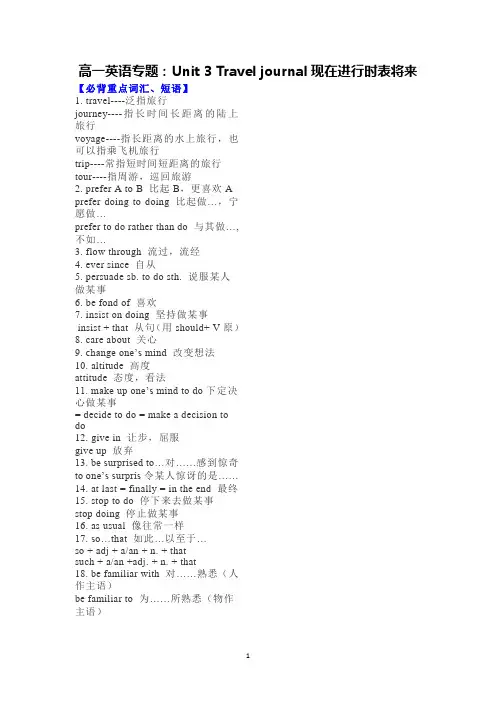
高一英语专题:Unit 3 Travel journal现在进行时表将来【必背重点词汇、短语】1. travel----泛指旅行journey----指长时间长距离的陆上旅行voyage----指长距离的水上旅行,也可以指乘飞机旅行trip----常指短时间短距离的旅行tour----指周游,巡回旅游2. prefer A to B 比起B,更喜欢Aprefer doing to doing 比起做…,宁愿做…prefer to do rather than do 与其做…,不如…3. flow through 流过,流经4. ever since 自从5. persuade sb. to do sth. 说服某人做某事6. be fond of 喜欢7. insist on doing 坚持做某事insist + that 从句(用should+ V原)8. care about 关心9. change one’s mind 改变想法10. altitude 高度attitude 态度,看法11. make up one’s mind to do下定决心做某事= decide to do = make a decision todo12. give in 让步,屈服give up 放弃13. be surprised to…对……感到惊奇to one’s surpris令某人惊讶的是……14. at last = finally = in the end 最终15. stop to do 停下来去做某事stop doing 停止做某事16. as usual 像往常一样17. so…that 如此…以至于…so + adj + a/an + n. + thatsuch + a/an +adj. + n. + that18. be familiar with 对……熟悉(人作主语)be familiar to 为……所熟悉(物作主语)【必背重点句型】1. My sister and I have dreamed about cycling along the Mekong River from where it begins to where it ends. 我姐姐和我一直梦想要沿湄公河从源头到终点骑车旅行。
Unit3Travel Journal单词识记__________n.运送;运输vt.运输;运送___________vt.更喜欢;选择某物(而不选择其他事物) ___________vt.说服;劝说___________vi毕业.n.大学毕业生___________adv.最后;终于___________n.时间表vt.为某事安排时间___________adj.喜爱的;慈爱的;宠爱的___________vt.组织;成立___________n.旅行;旅程___________n..缺点___________adj.可信赖的;可靠的___________prep.在…下面___________n..细节;详情___________vt.决定;确定;下定决心___________n.不利条件;不便之处__________vi.(指液体)沸腾;(水)开___________n&vt预测;预报___________n.风景;视野;观点;见解vt.观看;注视;考虑___________vi.骑自行车重点短语1.ever_______自从2.be_______of喜欢;喜爱3.care______关心;在乎4.change one’s_____改变主意5._______one’s mind下决心做某事6.give_____屈服;让步7.as______像往常一样8.at______在午夜9.prefer sth.______sth.喜欢…胜过…10.prefer(sb)______sth更喜欢(某人)做某事11.prefer______to______……宁愿做某事而不愿做…12.persuade sb(not)_____sth/persuade sb____(out of)doing sth说服某人(不)做某事13.insist_____sth/doing sth坚持(做)某事14.start______开始旅行;以…开始15.determine____sth决定做某事sb be______to do sth某人决心做…17._____water沸腾的水/boiled water18.dream______(of)sth梦见;梦想19.keep_____sth继续做某事(强调连续性)keep___doing sth.(强调重复性或决心)20.be familiar_____对…熟悉be familiar______为…熟悉重点语法有些表示短暂性动作的动词用现在进行时表示按计划,安排将要发生的事情,很少变更,如:来_______;去________;离开______;到达______;开始________ ______;停留_______;归还________;飞行________.等。
必修1 Unit 3 Trave ourna要点梳理高效梳理·知识备考●重点单词1.ourna n.日记;杂志;定期刊物→ournait n.记者2.tran e __________ one' tandard of iving收入决定一个人的生活水平。
2I have determined _________ going to the countride after graduation 我已决定毕业后到农村去。
3He firm determined ____________ in the word whatever it too他下定决心无论如何都要出人头地。
determineon/u fortabe, Zambiae, ou are wecome无论你什么时候来都受欢迎。
③No matter whoe bag thi i, it mut be eMiamie to heNew York Citye __3__ and get on the __4__ itThe net morning I went down to the __5__ at about 5 a.m, and four hour ater I __6__ the ca to come down to West Street I caed m wife and tod her not to __7__ me, and that I woud ta in __8__ with her I too the ubwa It toWest Fourth StreetSpaine et In the end, there came an announcement te u thatthe eaand that the Londone technicabe前加 toi→wate→teing第二个the→a√。
Unit3 Travel journalprefer vt.更喜欢.prefer A to B 比起B更喜欢Aprefer doing A to doing B 比起做B更喜欢做Aprefer to do sth 更喜欢做…prefer to do A rather than do B 宁愿做A也不做B更喜欢某人做某事1. She seems to prefer dogs to cats.2. My sister prefers staying at home watching TV to going to the cinema to see a film.3. I prefer to play outdoors rather than play computer games in the room.4. They preferred their son to go to college.5. Would you prefer that he (should) go with you?fare n.交通工具费用fee n. 入场费,会费,学费charge n. 要价cost n. 成本价flow through 流经…eg: The Mekong River flows through China.ever since…从…以后dream of = dream about…梦想…ever since Middle school, Wang Wei and I have dreamed about taking a bike trip.persuade vt. 说服;使相信try to persuade sb. to do sth. 劝说某人做某事(暗含“劝而不服”);persuade sb. into doing sth. 说服某人做某事;persuade sb. to do sth. 说服某人做某事;persuade sb. + that从句使某人相信……;persuade sb. of sth 使某人相信某事1. The son tried to persuade his father to give up smoking.2. How can we persuade them into joining us?3. I wish you could persuade her to think it over.4. She persuaded him that she was telling the truth.5. I persuaded him of my good intention.get sb interested in dong sth 使某人对做某事感兴趣sb graduate from…某人毕业于…sb get the chance to do sth 某人获得做某事机会sb be fond of sth 某人喜欢某物insist vt. 坚持要求,坚持认为Although she didn’t know the best way of getting to places, sheinsisted that she organize the trip properly. (P18)[点拨] insist表示“坚持要求,一定要”,其后宾语从句要用虚拟语气,谓语动词用动词原形或“should + 动词原形”。
高一英语第三单元TRAVEL JOURNAL 复习重点重点短语:1. get sb interested in 使某人对……感兴趣2. the best way of doing sth /the best way to do sth 干…最好的方法3. care about 关心忧虑4. care for /to do sth 希望或同意做某事care for sb 喜欢某人5. give in 投降让步6. make camp 野营宿营7. dream of doing 梦想做某事8. persuade sb into/out of (doing) sth 说服某人做某事/不做某事9. try to persuade sb to do 尽力说服某人做某事= advise sb to do sth10. insist on sth /doing sth 一定要(某事);坚决主张11. make up one’s mind 下定决心12. put up one’s tents 搭起帐篷13. set /break(beat)/hold a record 创造/打破/保持记录14. have a dream of sb/sth/doing sth 梦见某人/某物/梦想……15. dream of/about …dream a dream 16. be determined to do sth 决心干某事(表状态)17. determine sb to do sth 使某人下决心做某事(表动作)18. sb be familiar with sth 某人熟悉某物sth be familiar to sb 某物被某人所熟悉sb be familiar with sb 某人与某人亲密无间19. A be similar to B A与B相似20. read one’s mind 看出某人心事take one’s mind off sth 转移注意力keep one’s mind on sth 把注意力放在……keep/bear sth in mind 记住……She has many problems on her mind 她心事重重21. give in to sb 对某人让步give away赠送give off 放出(液体气体气味光热量) give out分发give in放弃重点单词1.journal n. 日记;杂志;定期刊物a medicine journal 医学杂志He kept a journal of his wanderings across Asia.他记载了一篇漫游亚洲的日记。
The girl decided to subscribe to a journal in English.这个女孩决定订阅一本英语杂志。
【拓展】journalist n. 新闻记者He is a journalist on the Daily China.他是《每日中国》的记者。
【注意】要表达写日记的时候,用动词keep,而不用write。
Please keep a journal of your travel in American.请把你在美国的旅行记录下来。
2.transport n.& v.运送;运输I think our goods will be taken good care of during transport. 我想我们的货物将会在运输期间保存的很好。
These goods were transported by railway and waterway. 这些货物是由铁路和水路运输的。
【辨析】transport与traffic 两者均有交通之意,但用法和含义都不同。
(1) transport指“运输”这种行为或者“运输工具”。
(2) traffic指街上的车马行人,着重数量的多少。
The city’s public transport system is excellent.这座城市的公共交通运输系统非常好。
Traffic is blocked in many places that day.那天许多地方交通堵塞。
【练习】⑴那辆黄色公共汽车将乘客从机场运送到城里。
The yellow bus_________________________from the airport to the city.⑵那些物品将用飞机运往青海玉树。
The goods ____________________ by plane to YuShu,Qinghai Province.答案:will transport the passengers ;will be transported3. prefer vt.更喜欢;选择某事物(而不选择其他事物)Which do you prefer, tea or coffiee?【拓展】prefer的常见搭配prefer sth 更喜欢某物prefer to do sth/doing sth 更喜欢做某事prefer sth to sth与某物相比更喜欢某物prefer doing sth to doing sth 宁愿做某事而不愿做某事prefer to do sth rather than do sth宁愿做某事而不愿做某事prefer sb to do sth宁愿某人做某事prefer that…(should) do sth 更喜欢…(that从句用虚拟语气)---Would you like pork or fish? ---I’d prefer pork , please.“你想要猪肉还是鱼肉?”“请给我猪肉吧。
”I prefer to go to America for my further study.我更愿意选择去美国进修学习。
Anne prefers me to replace her at the meeting.安妮更愿意我代替他参加会议。
Would you prefer that we put off meeting till next Friday. 你是否愿意我们把会议推迟到下周?【注意】prefer不用于进行时。
4.disadvantage n. 不利条件;不便之处What’s the main disadvantage of the plan? 这个计划的主要不利因素是什么?There are many disadvantages to your plan.你的计划有诸多不利因素。
【拓展】disadvantage构成的短语:at a disadvantage 处于不利地位to sb’s disadvantage 对某人不利的是put sb at a disadvantage 使某人处于不利地位have the disadvantage of 具有…的不利条件The fact that he couldn’t speak a foreign language left him at a disadvantage in the company. 他不会说外语的事实使他在公司处于不利地位。
5. fare n. 费用Have you given the kids their bus fare?你给孩子们乘公交的车费了吗?【辨析】fare, fee, price, expense 这几个单词都有“费用”之意,但用法不同。
(1)fare指交通费用,特指乘坐公共汽车、轮船、出租车等交通工具的费用。
(2)fee常用作复数形式(fees),指给律师、医生等专业人员的服务费用、酬金或(考试的)报名费、(加入俱乐部)的会费等。
(3)price专指“价格”,指某物的出售价格。
(4)expense指“支出、花销、费用”。
How much is the air fare from Beijing to Shanghai? 北京到上海的机票是多少?If you want to join the club, the entrance fee is $20.如果你想加入俱乐部,会费20美元。
What’s the price of the shoes? 这双鞋多少钱?Most children in Beijing are educated at public expense.北京大多数孩子接受公费教育。
6.flow vt.流动;流出n.流动;流量Her tears flowed freely down her face.她的泪水止不住地顺着脸颊往下流。
Most rivers flow into the sea.江河大多数流入海洋。
Keep the traffic flowing.保持交通畅通无阻。
There is a steady flow of traffic.车辆川流不息。
7.persuade vt.说服,劝说The man is not easily persuaded.这个人并不容易说服。
persuade的常见搭配persuade sb说服某人persuade sb to do sth / persuade sb into doing sth. 说服某人做某事persuade sb not to do sth / persuade sb out of doing sth 说服某人不做某事persuade sb of sth 使某人信服某事persuade sb that…使某人相信…Wang Kun couldn’t persuade his sister to change her mind.My mother persuaded me into/out of going to the party.How can I persuade you that I am telling the truth? 我怎样才能使你详细我说的是真话呢?He persuaded the police that he had been elsewhere when the accident was happening.他使警察相信当故事发生时他在别的地方。
【辨析】persuade和advise 两者均有“劝说”之意,但侧重点不同。
(1) persuade强调通过说理、恳求等方式说服别人同意做某事,侧重于结果(已说服)。
(2)advise指劝说某人去做某事,侧重于过程,至于结果如何,则不得而知。
advise sb to do sth相当于try to persuade sb to do sth。
advise可接动词的-ing 形式作宾语,也可接that引导的宾语从句(必须用虚拟语气即should+动词原形),而persuade不能。